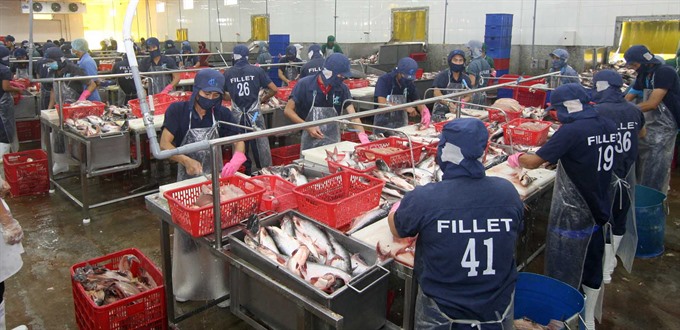 Economy
Economy

The export of tra (catfish) is still facing difficulties although exports for January-September hit US$1.3 billion, up 5.8 per cent over the same period last year, said the Vietnam Association of Seafood Exporters and Producers (VASEP).
 |
| Tra fish processing chain at the Hùng Cá Co Ltd’s factory in Đồng Tháp Province. — VNA/VNS Photo Vũ Sinh |
HÀ NỘI — The export of tra (catfish) is still facing difficulties although exports for January-September hit US$1.3 billion, up 5.8 per cent over the same period last year, said the Vietnam Association of Seafood Exporters and Producers (VASEP).
However, values declined in two important markets, the United States and Europe. Specifically, exports to the US reached $258.3 million, making up more than 19.8 per cent of total exports and down 9.9 per cent year-on-year.
In the European market, in August and September, exports fell by 8.4 per cent and 23.7 per cent respectively over the same period in 2016. By the end of September 2017, European exports accounted for only 11.8 per cent of total exports.
Vice Chairman of the Vietnam Pangasius Association Võ Hùng Dũng said in the meantime, the export value to the Chinese market was growing. A VASEP report showed that the total value of catfish exports to China and Hong Kong was more than $288 million in the first nine months of this year, marking a year-on-year increase of 42 per cent.
Dũng, who is also director of the Vietnam Chamber of Commerce and Industry’s branch in the southern province of Cần Thơ, said although the Chinese market was a breakthrough, there were still worrying signs, so the industry had to concentrate on big and fastidious markets such as the US and Europe.
"If we lose in these two markets and focus on the Chinese market, the risk will increase," Dũng warned.
To ensure stable export, Dũng said that the association had recently introduced tra fish products to Japan. If successful, it could lessen the risk of relying too much on Chinese demand.
According to the association, after the US decided to inspect 100 per cent of Vietnamese tra fish shipments in August, it has imposed an anti-dumping tax of $2.39 per kilogramme of Vietnamese frozen fish fillets during the 13th administrative review (POR13), three times higher than the single tax rate in the POR12.
Dũng said the US Farm Bill, which came into effect in 2016, states that catfish exports fall under the jurisdiction of US Department of Agriculture’s Food Safety and Inspection Service (FSIS), which is more concerned with anti-dumping duties.
He said that the anti-dumping tax on Vietnamese catfish had affected most tra fish exporters. However, a few processors with top quality fish had been allowed to pay low tariffs, including Vĩnh Hoàn, Biển Đông and Nam Sông Hậu.
Under the Farm Bill, all shipments of Vietnamese catfish to the US must be placed in US-designated storage for quality inspection before customs clearance. This costs time and money.
Director of Biển Đông Company Ngô Quang Trường said if Vietnamese wanted to export to the US, they must accept the difficulties.
“(However) the current price of tra fish product in the US market has increased to about $4 per kilo. This is an opportunity for enterprises to increase exports to this market through improving quality and exercising good farming, processing and marketing practices,” said Trường. — VNS




